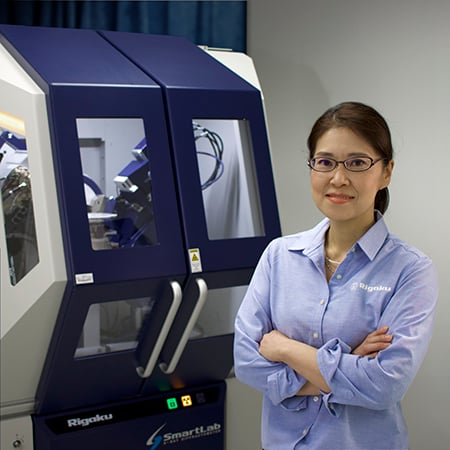Section 1: Using Thermal Analysis Techniques to Accelerate Preclinical Development of Pharmaceutical Products
Presenter: Genesis Infante, PhD
Do you ever wonder how pharmaceutical companies ensure the stability and efficacy of their products before they reach the market? Join us for an insightful webinar on the latest advancements in thermal analysis techniques for preclinical development of pharmaceutical products. This session will explore the critical role of thermal analysis in assessing the physical and chemical properties of active pharmaceutical ingredients and related compounds, understanding their stability, and optimizing formulation processes.
In this session, we will delve into various thermal analysis techniques, including Simultaneous Thermal Analysis (STA, TG-DTA) and Differential Scanning Calorimetry (DSC), highlighting their applications in drug discovery and pharmaceutical development. We will cover how gaining insights on the thermal behaviour of the active ingredient, such as mass loss due to degradation or dehydration, can directly impact the product development and formulation processes. In addition, the DSC method can be used to characterize crystallinity and elucidate on the effects of different states of polymorphism to the overall thermal properties.
What you will learn:
- Technique: Simultaneous Thermal Analysis, Differential Scanning Calorimetry
- Relevant lifecycle stage: Preclinical Development
- Explored applications:
- Mass loss/Dehydration of active pharmaceutical ingredients
- Sample observation capabilities – visualization of thermal events.
- Glass transitions, phase changes, melting point temperatures, and the effects of impurities.
- Processing and influence of mechanochemical treatment on thermal behavior.
- Calculating crystallinity and analyzing crystal polymorphs.
Who should attend:
- Pharmaceutical scientists and researchers involved in drug discovery.
- Researchers and formulation scientists.
- Anyone interested in learning about the applications of thermal analysis techniques in preclinical development.
Section 2: Unlocking Drug Potential: The Role of X-Ray Powder Diffraction in Preformulation
Presenter: Akhilesh Tripathi, PhD
Have you ever encountered unexpected formulation challenges, such as poor solubility, stability issues, or batch inconsistencies? These problems often stem from an incomplete understanding of a drug candidate’s solid-state properties.
X-ray Powder Diffraction (XRPD) is a critical tool in the preformulation stage of drug development, helping scientists analyze a compound’s crystalline structure to ensure optimal formulation. XRPD provides essential insights into polymorphism, crystallinity, phase purity, and drug-excipient compatibility—factors that directly impact a drug’s bioavailability, manufacturability, and regulatory approval.
In this episode, we’ll explore how XRPD supports preformulation by detecting polymorphs, assessing crystallinity, identifying unwanted phase changes, and evaluating excipient interactions. Through real-world examples, we’ll demonstrate how pharmaceutical scientists use XRPD to overcome formulation challenges and unlock the full potential of new drugs.
What you will learn:
- Technique: X-ray Powder Diffraction (XRPD) for solid-state analysis
- Relevant lifecycle stage: Preformulation
- Explored applications: Detecting polymorphs, assessing crystallinity, ensuring phase purity, and studying drug-excipient compatibility
Who should attend:
- Pharmaceutical scientists and formulation chemists working in drug development
- Solid-state chemists and materials scientists studying drug compounds
- Regulatory and quality control professionals ensuring drug consistency and compliance
- R&D professionals involved in optimizing drug solubility, stability, and manufacturability
Downloads
Download: Preclinical Development and Preformulation Slides
- C-Therm: https://ctherm.com/
- Thermal analysis techniques:
https://rigaku.com/products/thermal-analysis - Applications of Thermal Analysis and Coupled Techniques in Pharmaceutical Industry: https://link.springer.com/article/10.1023/A:101601511379
- TG-DTA/TG-DSC (STA): https://rigaku.com/products/thermal-analysis/sta/sta8122
- DSC: https://rigaku.com/products/thermal-analysis/dsc
- Test No. 113: Screening Test for Thermal Stability and Stability in Air (OECD article): https://www.oecd.org/en/publications/1981/05/test-no-113-screening-test-for-thermal-stability-and-stability-in-air_g1gh28df.html
- Mechanochemical Effect in Caffeine: https://rigaku.com/products/thermal-analysis/dsc/application-notes/ta1008-mechanochemical-effect-caffeine
- Thermoanalytical studies of carbamazepine: hydration/dehydration, thermal decomposition, and solid phase transitions (SciELO article): https://doi.org/10.1590/S1984-82502014000400023
- Water Absorption Behavior of Materials for Biomedical Application by HUM-TG: https://rigaku.com/products/thermal-analysis/sta/application-notes/ta1027-water-absorption-behavior-materials-biomedical
- Comparison and analysis of measurements for crystallinity of PEEK and CF/PEEK composites (Polymer Composites article): https://doi.org/10.1002/pc.29418
- DSC in characterizing polymer crystallinity and thermal properties (a book chapter): https://ncstate.pressbooks.pub/advancesinpolymerscience/chapter/differential-scanning-calorimetry-dsc-in-characterizing-polymer-crystallinity-and-thermal-properties/
- Sample observation 1: https://rigaku.com/products/thermal-analysis/dsc/dscvesta2-sample-observation
- Sample observation 2: https://ctherm.com/resources/webinars/innovation-calorimetry-sample-observation/
- Dynamic DSC: https://rigaku.com/products/thermal-analysis/accessories/dynamic-dsc
- XRD application to pharmaceuticals (past webinars): https://rigaku.com/industries/biotech-and-life-science/pharmaceuticals/webinars/xrd-application-pharmaceuticals
- Direct derivation (DD) of weight fractions of individual crystalline phases from observed intensities and chemical composition data: incorporation of the DD method into the whole-powder-pattern fitting procedure: https://doi.org/10.1107/S1600576718001474
- A new method for quantitative phase analysis using X-ray powder diffraction: direct derivation of weight fractions from observed integrated intensities and chemical compositions of individual phases. Corrigendum: https://doi.org/10.1107/S160057671700365X
- XRD-DSC technique and applications: https://rigaku.com/resources/techniques/combined-xrd-dsc
About the presenters

C-Therm Laboratory | Fredericton, NB, Canada
Dr. Genesis Infante is a Materials Scientist that joined C-Therm’s team early in 2022. While acting as the Laboratory Services Manager at C-Therm, he also works closely with the Engineering department on application and method developments. On top of that, he has held other roles such as Occupational Health & Safety (OHS) Manager, a very important position within the company, especially during challenging times such as the COVID-19 pandemic. Genesis has a Bachelor of Science in Chemistry with Honours and a PhD degree in Organic Chemistry from the University of New Brunswick (UNB). Want to learn more? Connect with Genesis Infante, PhD LinkedIn .

Rigaku | Texas, USA
Akhilesh Tripathi is the XRD Application Manager at Rigaku Americas, a division of Rigaku Americas Holding, located in The Woodlands, Texas. With 30 years of experience in materials characterization using powder and single crystal X-ray diffraction, Akhilesh has dedicated 20 of those years to his work at Rigaku. His expertise spans a range of X-ray techniques, including Rietveld analysis, small-angle X-ray scattering, thin-film characterization, and various quantitative phase analysis methods. Akhilesh is well-versed in conducting XRD-related training, both onsite and offsite, sharing his extensive knowledge with others in the field. He holds a Ph.D. in Chemistry and Material Science from Stony Brook University and completed postdoctoral research at Texas A&M University. Akhilesh has also contributed to the scientific community with over 28 papers published in peer-reviewed journals on these subjects. Want to learn more? Connect with Akhilesh Tripathi LinkedIn .

Contact Us
Whether you're interested in getting a quote, want a demo, need technical support, or simply have a question, we're here to help.

Subscribe to the Bridge newsletter
Stay up to date with materials analysis news and upcoming conferences, webinars and podcasts, as well as learning new analytical techniques and applications.



